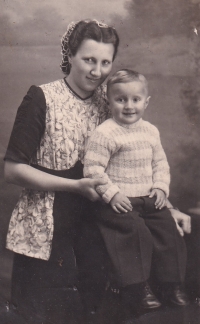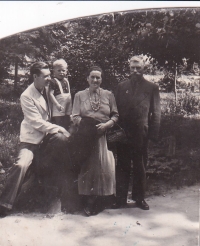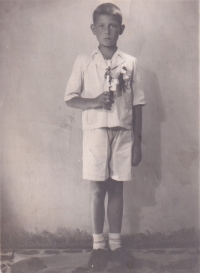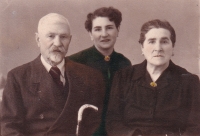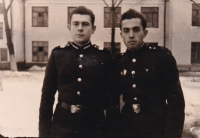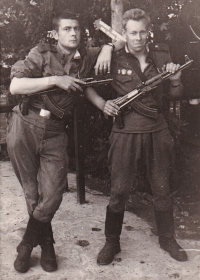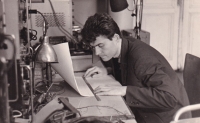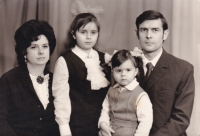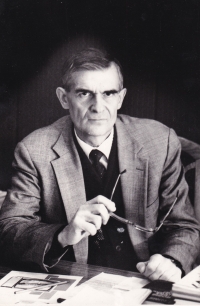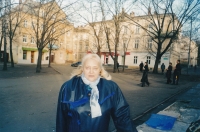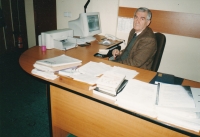And I was so impressed by that [watching Exodus 1947], because it turned out that I... I basically had a problem with the British. How so? You were allies, you fought against Germany. How could you do this to the Jews? And so on. I was so interested that I decided to do a little reading on the subject. I started reading various books, but I knew nothing about Jews at all. Who are Jews? What are their customs? Religion? And so on. I started looking for books to read, but Soviet people had only six volumes of Sholem Aleichem about Jews. And Sholem Aleichem mainly described the lives of Jewish artists; in short, from Sholem Aleichem one can understand little about how Jews lived, worked, and so on. I started looking for other books in libraries. There was nothing anywhere. Then I was told that there was a Jewish society that had its own library, and it was located on Vuhilna Street, and there was a synagogue there, called Jakob Glanzer Shul. I went there, and Olya Fadeeva was sitting there, she is now the head of the library, although now the organization has moved to 30 Kotliarevskoho [Street]. I went to her. “Are you a Jew?” I said, "Well, my mother was Jewish, so I'm very interested in the Jewish question, they say you have books.” — ”Yes, we have books, all books are exclusively on Jewish topics, we don't have Pushkin, we don't have Lermontov, but we have many books by Jewish authors.” I said, "Well, give me a book to read.” — “No, you know, if you were a Jew, but are you?” — "I am" — “No, do you have any documents that you are a Jew? A birth certificate.” I said, "No.” — “We cannot register you with the library and give you books.” Well, but I found my way. I found my relative, Hanna Vuytsyk. So, my grandmother Pavlina had a younger brother, even younger than her, his name was Yakub Lukanych. They lived in Brody, in the center, near the market. They had Jewish neighbors, their last name was Groiss. When the Germans began to form a column of Jews with suitcases to be loaded onto a train going to Belzec, to the concentration camp, well, it wasn't a concentration camp, but a death camp. So their neighbor brought the girl, this Hania, Hana, to my grandmother's brother, I don't even know how related he is to me, but my grandmother is my relative, and her brother is my relative. And that Jewish woman said, "Take the child, and when we come back, we will take it from you, we will thank you, that's all.” They didn't have time to talk for a long time, they took the child, the others left, and that was that. They adopted the child, she graduated from the Plekhanov Institute in Moscow, she is an economist. She was an exceptionally intelligent woman because she was Jewish. Then she got a job here in Lviv, married a Ukrainian by the name of Vuytsyk, and then she looked for her cousins who were still alive. One was in Israel, the other in America. The one in Israel told her, "No, no, no, you can't come to us, we can't take you in, we are poor, so poor.” And the one from America came here on her own. To cut a long story short, I had this relative named Hania. And I didn't really keep in touch with her, but from time to time, we met somewhere. And then I turned to her. I said, "Listen, how do I get to that library?” She said, "I'm registered there.” I said, "Well, the one who sits there doesn't want to give me a book.” — ”Well, she won't give you one, let's meet with you.” So I met with her, and we went to that library together. She said, "Which one do you want to borrow?” And then I was told to read the very first book that I should read to get acquainted with the Jewish question, Golda Meir's memoirs My Life. I said, "I want to read Golda Meir.” Hania says to Olya, "Put Golda Meir on my card. Now, what should I take to read?” ”Well, I think that next to Golda Meir is Ben-Gurion. Take the one about Ben-Gurion, and then we'll swap." And that's how I got enrolled in that library, that is, Hania borrowed the books for me.

